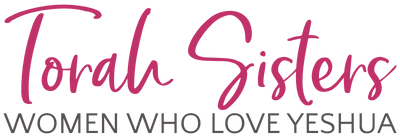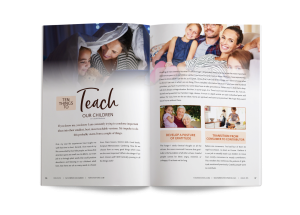
This article is in the November/December 2023 Issue 15 of Torah Sisters Magazine.
By Rachel Henderson
If you know me, you know I am constantly trying to condense important ideas into their smallest, best, most teachable versions. My impulse to do this probably stems from a couple of things. First, my own life experiences have taught me well that time is short. Second, I live most of my life surrounded by four little people, so I know that attention spans are small, too. As Moms, our main job is to lovingly plant seeds that could produce abundance and blessing in our children’s adult lives. But there are oh so many seeds to choose from. Piano lessons. Kitchen skills. Good books. Scripture Memorization. Gardening. How do we choose from so many good things which ones are the most important? What is the danger if we don’t choose well? Will frantically pouring in all the things work?
A calling of mine seems to be what I’ll call life triage. I desperately want to know what the most important ideas are to pass on to our children so that I can focus first and most on those. Perhaps more importantly, I want to know what I can let die, so to speak. I know that I can’t do all the things, so I want to know what to do so I can rest in what I am not doing. This is valuable information because if you have one hundred priorities, you have no priorities. So, some ideas have to take precedence. Others won’t. And that’s okay. Life isn’t always a triage situation. But then, in some ways, it is. Time is our scarcest resource. So, I’ve collected and presented our families’ triage choices. A more in-depth article on each individual point will follow. For now, here are the ten ideas. Some are spiritual, and some are practical. We hope they won’t leave home without these.
Develop a posture of gratitude.
The longer I study classical thought on all the virtues, the more convinced I become that gratitude is the foundation of all other virtues. Grateful people cannot be bitter, angry, resentful, or unhappy. Or at least not for long.
Transition from consumer to contributor.
Babies are consumers. I’ve had four of them (in rapid succession, no less), so I know. I believe it is our job to steadily teach our children to move from mostly consumers to mostly contributors. This mindset also reinforces the posture of gratitude mentioned previously. Grateful people want to contribute.
Adopt a work, play, rest rhythm.
I am determined to help our children learn to love each of these seasons. We work, then we play, then we rest. And none of them last forever, so we lean into each. We are trying to learn the habit of being exactly where we are and to be fully immersed in the blessings of that season.
Tell the truth, or at least don’t lie.
We often tell the kids that the adventure of their life is only to say things they know to be true. It’s harder to do than it sounds. It is also true that if lying destroys, then truth-telling creates. There’s no telling what kind of amazing adventure truth-telling could create for them (and us)!
Recognize the power of habit building.
The more you can put on auto-pilot, the fewer decisions you have to make. As parents, we can give the gift of good habits, whether they are physical, mental, or moral. A person can have the habit of telling the truth just as much as they can have the habit of making their bed each morning.
Less is more.
You know I couldn’t make this list without mentioning this. I have been known to give an apology or two to a child whose masterpiece I threw away in order to enjoy the sweet joy of a clear counter. What I really want them to understand is the lesson of opportunity cost. If we spend our time doing this, it means we are not spending our time doing something else. So let’s make those decisions on purpose. Saying no enables us to give a hearty yes to the things most important to us!
Move towards problems rather than away from them.
We believe that voluntary confrontation of difficult things in our lives is the best way through them. The dragon only gets bigger if you continue to ignore it. Most of our problems begin as kitten-sized dragons. That is a dragon that can be slayed if only we would move toward it, notice it, and begin the work of fixing it.
Create and communicate clear boundaries.
In order to be able to say yes to the things Yah wants for us, we have to get really good at saying no to everything else. The challenge of this is that you have to know your highest values in order to develop boundaries around them. This is an active, integral part of our regular lives. Communicating those boundaries is to practice the art of being both kind and firm, which is a skill set we see as absolutely necessary.
Take ownership.
We recognize that freedom and responsibility are two sides of the same coin. While we will be victims of many things outside our control, we are not powerless to change. We accept the responsibility to order our lives and see it as a blessing to be able to do so.
Make friends with what you don’t know.
I have heard it said that there are two types of people: those who are in love with what they already know and those who are enchanted by what they don’t know. Making friends with what you don’t know requires two things. First, it requires the humility to acknowledge you don’t know lots of things. Second, it requires the willingness to change based on learning new things.
It is peaceful to know exactly what we are prioritizing. It becomes okay that we won’t get to every other idea as long as we are focusing on these. There is rest in that. I encourage you to develop your own triage ideas, the ones you want to outlive you. And then get to work planting those seeds.
About Rachel
My name is Rachel, and I am a married, homeschooling Mom to 4 children. I believe we are put here to have simple and abundant lives. I am so grateful for Yah’s perfect instructions which pave the way to that abundance. I enjoy reading, writing, gardening and curating a simple and meaningful home for our family.


That was lovely. And so many things I need to work on! Great advice for a mom of a 3yr old.